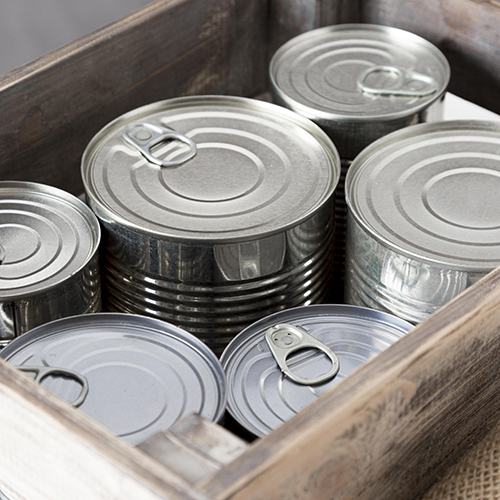All You Need to Know About Canned Food

Do cans get damaged by heat?
Yes, cans can be damaged by excessive heat. It's important to store them in a place where the temperature stays below 40°C. For more details on proper storage, please refer to the section "How to store canned food properly?"
Do cans expire?
You can tell if a can is no longer good by the presence of mold and if the can is rusty, dented or bulging, indicating a leak. If there is an abnormally cloudy liquid or a fermented, acidic smell, it is a sign that the can is no longer good. Finally, a sour, metallic or putrid taste also indicates that the cans should be discarded. Cans offer airtight and lightproof packaging, allowing for storage well beyond the indicated expiration date, provided they are stored correctly.
How to store canned food properly?
It is best to store unopened cans in the pantry or cellar. The temperature should stay below 40°C. Persistent humidity should be avoided so that the cans do not rust. It is best to put the remaining food from the opened can in a screw-top glass jar, as the tinplate or plastic inside the can can release harmful substances. Leftovers from the can can be stored in the refrigerator for another 2 to 4 days.
How to recognize cans that are no longer good?
You can tell if a can is no longer good by the presence of mold and if the can is rusty, dented or bulging, indicating a leak. Similarly, if there is an abnormally cloudy liquid or a fermented, acidic smell, it is a sign that the can may no longer be good. Finally, a sour, metallic or putrid taste also indicates that the cans should be discarded, and disposed of properly.
Tips for buying canned food?
When purchasing, it is particularly important to pay attention to ensure that the cans are intact. At CEBONAT, we deliver cans with standard lids (easy-open lids available on request). Find all our canned goods HERE.
How to properly dispose of cans?
If the contents of your cans are no longer consumable, the best thing to do is throw them in the organic waste. Throw the can in the metal collection (yellow bin).
What is the best tool for opening cans?
To effortlessly open any size can up to 50cm in height, we recommend using our professional stainless steel can opener. This product is solid, robust and very easy to use. Its stainless steel rod and plate and cast iron head ensure unmatched durability and efficiency.
General information about canned food
We are used to the fact that the taste and texture of canned food do not match fresh products, so old cans should not be evaluated first and foremost based on these criteria. When stored correctly, canned food can of course be kept for a very long time, but this results in a loss of taste and texture. Cans offer airtight and lightproof packaging inside which food can often be stored well beyond the indicated expiration date. However, in damaged cans, the contents can easily deteriorate. Botulinum toxin can develop. Contamination with botulinum toxin can be recognized by bulging or curved lids. Affected cans should be immediately disposed of closed, as toxic gases may escape when opened.
| DIAMETRE | SIZE | HIGH | CAPACITY | Quantity per |
| à titre indicatif (KG) | CARTON | |||
| 153 | 5/1 | 246 | 4,000 | 24 |
| 153 | 3/1 | 180 | 1,900 | 36 |
| 153 | 2/1 | 130,5 | 1,500 | 48 |
| 153 | 7/5 TAMB | 92 | 1,300 | 72 |
| 153 | 5/4 | 72 | 1,000 | 84 |
| 100 | 2/1 | 228 | 1,500 | 50 |
| 100 | 7/5 TAMB | 161 | 1,000 | 75 |
| 100 | 4/4 | 118 | 0,800 | 100 |
| 100 | 3/4 | 91 | 0,600 | 115 |
| 100 | 1/2 | 63 | 0,400 | 200 |
| 100 | 1/4=1/3 | 45 | 0,250 | 230 |
| 86 | 1/3 | 57 | 0,250 | 240 |
| 86 | 3/4 | 116 | 0,600 | 120 |
| 86 | 1/4 | 45 | 0,200 | 300 |
| 83 | 1/3 | 60 | 0,250 | 210 |
| 83 | 3/4 | 115 | 0,560 | 120 |
| 83 | 1/2 | 85 | 0,460 | 150 |
| 83 | 1/4 | 47 | 0,200 | 300 |
| 73 | 5/4 | 260 | 1,000 | 84 |
| 73 | 3/4 | 158 | 0,600 | 126 |
| 73 | 1/2 | 109 | 0,400 | 180 |
| 73 | 1/4 | 58 | 0,200 | 294 |
| 73 | 1/6 | 42 | 0,130 | 100 |
| 71 | 1/2 | 115 | 0,400 | 184 |
| 71 | 1/4 | 62 | 0,200 | 194 |
| 71 | 1/6 | 44 | 0,130 | 100 |
| 55 | 1/4 | 97 | 0,200 | 100 |
| 55 | 1/6 | 68 | 0,130 | 150 |
| 55 | 1/8 | 52 | 0,100 | 200 |
| 55 | 1/12 | 37 | 0,065 | 300 |




